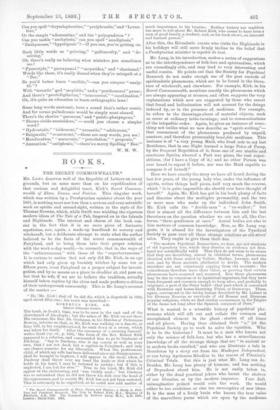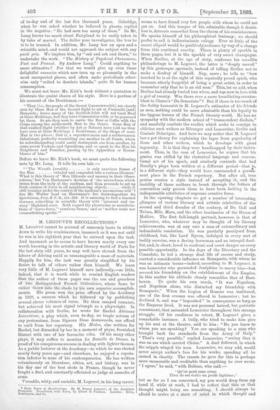BOOKS.
THE SECRET COMMONWEALTH."
Mn. LANG deserves well of the Republic of Letters on many grounds, but on none more than on his republication of that curious and delightful tract, Kirk's Secret Common- wealth of Elves, Fauns, and Fairies. This singular work, which was written by a Presbyterian minister about the year 1691, is nothing more nor less than a serious and semi-scientific work on spirits and second-sight, written in the style of Sir Thomas Browne, which, while Swift was wielding the vigorous modern idiom of The Tale of a Tub, lingered on in the Islands and Highlands. The interest and charm of the book con- sist in the fad that it is no mere piece of fantastic mysticism, nor, again, a made-up handbook to sorcery and witchcraft, but a deliberate attempt to state what the author believed to be the facts of the secret commonwealth of Fairyland, and to bring them into their proper relation with the work-a-day world,—to reconcile, that is, the ways of the " subterraneans " with those of the " euperterraneans."
It is curious to notice that not only did Mr. Kirk, in an age which had only given up burning witches by some ten or fifteen years, treat Fairyland as a proper subject for investi- gation, and by no means as a place to shudder at, and pass on, but that he wts, if we are to believe the tradition, actually himself taken captive by the elves and made perforce a citizen of their underground community. This is Mr. Lang's account of the matter :— "He [Mr. Kirk] died (if he did die, which is disputed) in 1602, aged about fifty-one ; his tomb was inscribed-
RO]3ERTUS KIRK, A.M.
Ling= Hibernim Lumen.
The tomb, in Scott's time, was to be seen in the east end of the churchyard of Aberfoyle ; but the ashes of Mr. Kirk are not there. His successor, the Rev. Dr. Grahame, in his Sketches of Picturesque informs nforms us that, as Mr. Kirk was walking on a dun-ski, or fairy hill, in his neighbourhood, he sunk down in a swoon, which was taken for death. ` After the ceremony of a seeming funeral,' writes Scott (op. cit., p. 105), ` the form of the Rev. Robert Kirk appeared to a relation, and commanded him to go to Grahame of Duchray. " Say to Duchray, who is my cousin as well as your own, that I am not dead, but a captive in Fairyland; and only one chance remains for ray liberation. When the posthumous child, of which my wife has been delivered since my disappearance, shall be brought to baptism, I will appear in the room, when, if Duchray shall throw over my head the knife or dirk which he holds in his hand, I may be restored to society ; but if this is neglected, I am lost for ever."' True to his tryst, Mr. Kirk did appear at the christening, and 'was visibly seen ; ' but Duchray was so astonished that he did not throw his dirk over the head of the appearance, and to society Mr. Kirk has not yet been restored. This is extremely to be regretted, as he could now add matter of * The Secret Commonwealth of Elves, Fauns, and Fairies : a Study in Folk. Lore and Psychical Research. The Text by Robert Kirk, LA., Minister of Aberfoyle, A.D. 1891. The Comment by Andrew Lang, ILA., A.D. 148, London David Nutt. 1893.
much importance to his treatise. Neither history nor tradition has more to tell about Mr. Robert Kirk, who seems to have been a man of good family, a student, and, as his book shows, an innocent and learned person."
After this, the Ritualistic curate who visits the Highlands in his holidays will still more firmly incline to the belief that a Presbyterian minister is capable de tout.
Mr. Lang, in his introduction, makes a series of suggestions as to the interdependence of folk-lore and spiritualism, which are exceedingly able, and may lead to very interesting and useful results. He points out that the Society for Psychical Research do not make enough use of the past records of spiritualistic phenomena, which are to be found in the litera- ture of witchcraft, and elsewhere. For example, Kirk, in his Secret Commonwealth, mentions exactly the phenomena which are always appearing at seances, and often suggests the very explanations which now are suggested by those who assert that fraud and hallucination will not account for the doings induced by, or in the presence of, mediums. For example, he refers to the throwings-about of material objects, such as occur at ordinary table-turnings ; and to communications of the telepathic order. Again, he gives an instance of some- thing not unlike what we now describe as " spirit-writing,"— that commonest of the phenomena produced by unpaid, amateur, and therefore presumably bond-fide mediums. This instance is of "a very young Maid, who lived noir to my last Residence, that in one Night learned a large Peke of Poesy, by the frequent Repetition of it, from one of our nimble and courteous Spirits, whereof a Part was pious, the rest super- stitions, (for I have a Copy of it,) and no other Person was ever heard to repeat it before, nor was the Maid capable to compose it of herself."
Here we have exactly the story we have all heard during the last few years, of the young lady who, under the influence of spirits, writes things half pious, half very much the reverse, which "it is quite impossible she should ever have thought of herself." Again, Mr. Kirk has got in his book plenty of facts and theories about the multiplex personality, and the two or more men who make up the individual John Smith. Mr. Kirk calls the "doable-man" a " co-walker ; " but that is almost all the difference between him and the last theorisers on the question whether we are not all, like Cer- berus, "three gentlemen at once." Astral bodies are also to him matters of common knowledge. Now, as Mr. Lang sug- gests, it is absurd for the investigators of the Pyschical Society to pass over all these strange relations as old-wives' tales. They ought to give them their due.
"The modern Psychical Researchers, we fear, are not students of old legendary lore, which they dismiss on evidence not first- hand nor scientifically valid. Thus they do not seem to be aware that they are describing, almost in identical terms, phenomena identical with those noted by Telfair, Mather, Lavater, and the rest, and by those ancients attributed to devils. The modern recorders are not consciously copying from old accounts ; the coincidences therefore have their value' as proving that certain phenomena have occurred and recurred. Now those phenomena may be due to conscious or to hysterical imposture, but they have been frequent and common enough to keep alive, and probably to originate, a part of the Fairy belief—that part which is concerned with Brownies and house-haunting Pixies, or Doinovoys. These, again, correspond to the tricky beings described by Mr. Leland in his Etru,scan Remains as survivals of old Roman and Etruscan popular religions, while we find similar occurrences in the Empire of the Incas not long after the Spanish conquest of Peru."
What is wanted is a scientific history of psychical phe- nomena which will sift out and collate the common and unexplained element in the ghost - stories of all times and all places. Having thus obtained their "x," let the Psychical Society go to work to solve the equation. Who is to be the historian P It must be a man who knows not only the science of folk-lore, but who has a miscellaneous knowledge of all the strange things that are "in ancient or in modern books enrolled," and who can illustrate a tale in Herodotus by a story cut from the Muskegon Independent, or can bring Apolonias Rhodius to the rescue of Pitcairn's Criminal Trials. But this is just what Mr. Lang can do. Besides, Mr. Lang has plenty of humour, and has nothing of Dryasdust about him. He is not easily taken in either by the dead practical jokers who haunt the shelves of our libraries, or by the modern impostor. Your dull, unimaginative pedant would ruin the work. He would either be too credulous or else too unreceptive of new ideas. It is the man of a lively brain who knows the true value of the marvellous yarns which are spun by the mediums of to-day and of the last five thousand years. Coleridge, when he was asked whether he believed in ghosts, replied in the negative : "He had seen too many of them." So Mr.
Lang knows too much about Fairyland to be easily taken in by tales of marvel. The duller your investigator, the less he is to be trusted. In addition, Mr. Lang has an open and a scientific mind, and would not approach the subject with any parti pris. We implore him, by "oak and ash and thorn," to undertake the work. "The History of Psychical Phenomena, Past and Present. By Andrew Lang." Could anything be more attractive ? For that we would give up even those delightful causeries which now turn up so pleasantly in the most unexpected places, and often make periodicals other- wise only "suited to desolate islands," quite fit for human consumption.
We must not leave Mr. Kirk's book without a quotation to illustrate the quaint charm of his style. Here is a portion of his account of the Doublemen :— "They [i.e., the people of the Secret Commonwealth] are clearly seen by those Men of the Second Sight to eat at Funeralls [and] Banquets ; hence many of the Scottish-Irish will not toast Meat at these 1VIeittings, lest they have Communion with, or be poysoned by, thorn. So are they seen to earrie the Beer or Coffin with the Corps among the midle-earth Men to the Grave. Some Men of that exalted Sight (whither by Art or Nature) have told me they have seen at these Meittings a Doubleman, or the Shape of some Man in two places ; that is, a superterranean and a subterranean Inhabitant, perfectly resembling one another in all Points, whom he notwithstanding could easily distinguish one from another, by some secret Tockens and Operations, and so speak to the Man his Neighbour and Familiar, passing by the Apparition or Resem- blance of him."
Before we leave Mr. Kirk's book, we must quote the following note by Mr. Lang. It tells its own tale :— " The Wreath (wraith) is only exuvious fumes of
the Man exhaled and congealed into a various likeness.'
What is this theory of Men illiterate and unwary in their Obser- vations,' but Von Hartmann's doctrine of the nerve-force which issues from the body of the medium, and then proceeds to set up
fresh centres of force in all neighbouring objects while it still remains under the control of the medium's unconscious will' ? See Mr. Walter Leaf on Hartmann's Der feisterkypothese des Spiritismue, Proc. S. P. R., xis. 293. It is amusing to find a learned German coinciding in scientific theory with ignorant and un- wary' Highland seers. Both regard the phantasms as manifesta- tions of nerve-force," exuvious fumes,' and as neither souls nor counterfeiting spirits."



































 Previous page
Previous page